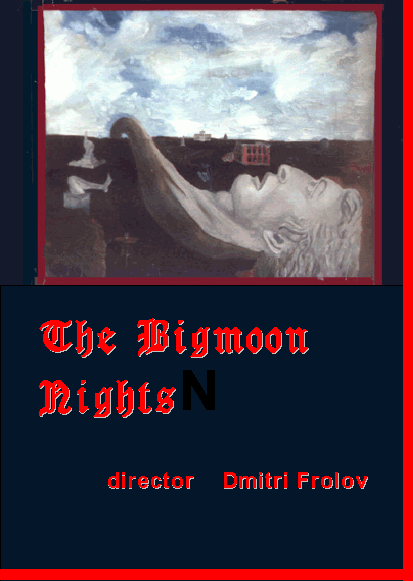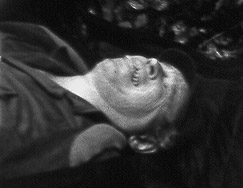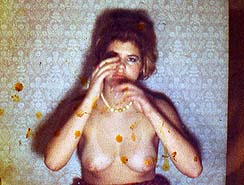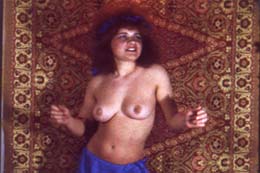|


__________________________________________________
The Bigmoon Nights
Russia, 90 min., 16mm
Cast: Oriza Trizn'ak, Yuliya Smirnova, Igor' Arsenyev, Alexey Frolov, Mikhail Kulybin, Natalya Sourkova, Nikolay Mouraviev, Dmitri Shibanov, Peter Kremis, Vladimir Ignatyev, Alexandr Pavlov, Vladimir Zolotar' etc.
Director, camera and script - Dmitri Frolov
A painting of Dmitri Frolov was used at the film
Animation - Konstantin Arefiev
---------------------------------------------------------------------------------------------

About mirrors in lunar night.
There is a proverb: "This is not bad mirror, this is your face like a horror". Therefore, nobody loves mirrors, everybody sees in them something demonic, so well reflected in works of worldwide art. At Russia mirrors were in long time accepted for closing at bigmoon nights, nights of the true.
 The film-trilogy of Dmitry Frolov The Bigmoon Nights too would like to cover and nobody to show. As if someone at one time for a long time, when you were the mad teenager, trapped you, with the film equipment in hands, in a toilet when you there� A film was hidden, and after ten-fifteen years was taken and scrolled at the large congestion of the people. You absolutely forgot that time, you consider yourselves as another - clever and strong, deprived of youthful complexes, but, having seen that yourselves on the screen, you suddenly realize, what, in effect, you are same mad teenager, and you are still in same "charmed" place, and the complexes have not disappeared anywhere, but were only aggravated and slightly cicatrized. Is it disgusting? Yes, it is disgusting.
The film-trilogy of Dmitry Frolov The Bigmoon Nights too would like to cover and nobody to show. As if someone at one time for a long time, when you were the mad teenager, trapped you, with the film equipment in hands, in a toilet when you there� A film was hidden, and after ten-fifteen years was taken and scrolled at the large congestion of the people. You absolutely forgot that time, you consider yourselves as another - clever and strong, deprived of youthful complexes, but, having seen that yourselves on the screen, you suddenly realize, what, in effect, you are same mad teenager, and you are still in same "charmed" place, and the complexes have not disappeared anywhere, but were only aggravated and slightly cicatrized. Is it disgusting? Yes, it is disgusting.
Dmitry Frolov do not likes to tell. He likes to show. Frolov always preferred the image to a trite sound (he is quite good artist), madly loving "the great mute" and once and for all having decided, that the cinema is a kind of fine art, but - anything more. Only sometimes Dmitry Frolov uses a simple music, however, at all not changing thus to elected stylistics: in cinemas of a beginning of the last century the films too went under accompaniment of pianists. But many old melodies becoming again popular in last years was dug out by the film-director Frolov (immortal "Sixteen tons" already sounded in first and then sole part of Night, shocking everybody by its novelty and uncertainty), but while he put on ������� and searched for the mislaid cane, he was outstripped by smooth DJs in more modern suit. Whether it is sadly? Yes, it is sadly.
,  Dmitry Frolov is a real name of the director. It is not a pseudonym. Therefore Dmitry can in quiet, without an anguish and a pathos, to reason on the screen on essential problems of life. For such film, as The Bigmoon Nights, it is a considerable trump, because the header role in it is "played" by russian wood and "stone jungle". Ancient slavic tribes loved a wood. Only then the national imagination has occupied a wood of terrible ogres and covered with a fog of gloomy legends � Whether to image the love to a native Land as a love to birches? It is ridiculously: a tree is a quite cosmopolitan. There are birches and in Germany. And New York in this sense a little than differs from St.-Petersburg (not a native land of Tom Sawyer, but former capital of Russia). The wandering of the main hero of Night, thus, comes to an end by impasse: he has come there, whence began the way, but while he wandered in searches something to him to one necessary and clear, his house has turned in swamp, on which it is not so a shame to make a crime � Is it vile thing? Yes, it is vile thing.
Dmitry Frolov is a real name of the director. It is not a pseudonym. Therefore Dmitry can in quiet, without an anguish and a pathos, to reason on the screen on essential problems of life. For such film, as The Bigmoon Nights, it is a considerable trump, because the header role in it is "played" by russian wood and "stone jungle". Ancient slavic tribes loved a wood. Only then the national imagination has occupied a wood of terrible ogres and covered with a fog of gloomy legends � Whether to image the love to a native Land as a love to birches? It is ridiculously: a tree is a quite cosmopolitan. There are birches and in Germany. And New York in this sense a little than differs from St.-Petersburg (not a native land of Tom Sawyer, but former capital of Russia). The wandering of the main hero of Night, thus, comes to an end by impasse: he has come there, whence began the way, but while he wandered in searches something to him to one necessary and clear, his house has turned in swamp, on which it is not so a shame to make a crime � Is it vile thing? Yes, it is vile thing.
The majority of films of Dmitry Frolov has not a plot. I mean that each other of plots in one film it happens so much, that them not always will follow. Looking, how many to have a drink. Therefore to retell, usually, there is nothing. But we shall try. In first, as most subject and dynamical, parts of film the main hero (we shall name him conditionally "not sacred Antonius") is exposed to various animal temptations: he is overcome by famine, aspiration to kill to sate flesh, aspiration to full swinishness, tempt women and a military adjusted horse.  All it the hero (or not a hero?) does not maintain and falls in direct and portable sense, having got out from woods on a glade (in general optimistical ending). In the second part - temptation of a civilization: TV, pop, epaulets, propagation. Here again he gives in, falling deeper: to murder on ideological reasons (that is, for the sake of saturation not of flesh, but bottom floors of soul). The third part, beautiful, but mad, obviously illustrates delirium of this man who has appeared eventually in a bedlam. Is it banal? Well, retell a plot of Hamlet or Eugene Onegin � However, the books should be read, and films - look. Differently what for they are necessary? Not only for the school compositions. And the film The Bigmoon Night is much deeper and more ambiguously, than it just seemed to you. In essence, this mirror (not so curve), in which our recent past is reflected, to which we assigned such hopes, but it has left not similar to the ending of the novel of Tchernyshevski What To Do?. Now we do not have special hopes, we came to the beginning, having described a circle. Slightly we shall sit, we shall pretend, that we shall think, and we shall again be set in a way, that, having described the next circle, again to be looked in a mirror. Whether it will be again so disgust? The other Frolov in other The Bigmoon Nights, night of the true, will tell already about it to us. All it the hero (or not a hero?) does not maintain and falls in direct and portable sense, having got out from woods on a glade (in general optimistical ending). In the second part - temptation of a civilization: TV, pop, epaulets, propagation. Here again he gives in, falling deeper: to murder on ideological reasons (that is, for the sake of saturation not of flesh, but bottom floors of soul). The third part, beautiful, but mad, obviously illustrates delirium of this man who has appeared eventually in a bedlam. Is it banal? Well, retell a plot of Hamlet or Eugene Onegin � However, the books should be read, and films - look. Differently what for they are necessary? Not only for the school compositions. And the film The Bigmoon Night is much deeper and more ambiguously, than it just seemed to you. In essence, this mirror (not so curve), in which our recent past is reflected, to which we assigned such hopes, but it has left not similar to the ending of the novel of Tchernyshevski What To Do?. Now we do not have special hopes, we came to the beginning, having described a circle. Slightly we shall sit, we shall pretend, that we shall think, and we shall again be set in a way, that, having described the next circle, again to be looked in a mirror. Whether it will be again so disgust? The other Frolov in other The Bigmoon Nights, night of the true, will tell already about it to us.
Ignaz Bobtschuk (Translated from Russian into English by Robot)
 ---------------------------------------------------------------------------------------------
---------------------------------------------------------------------------------------------


|
|